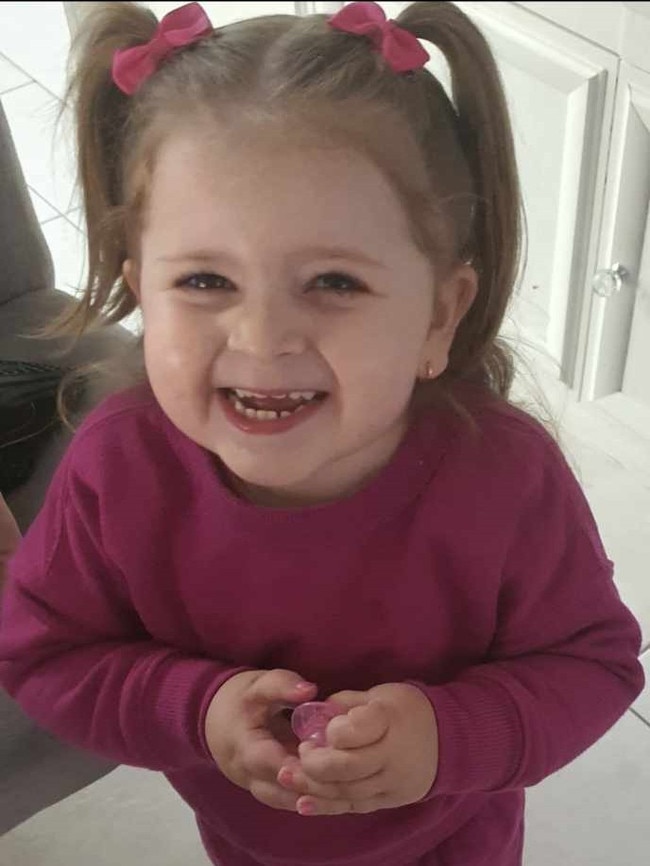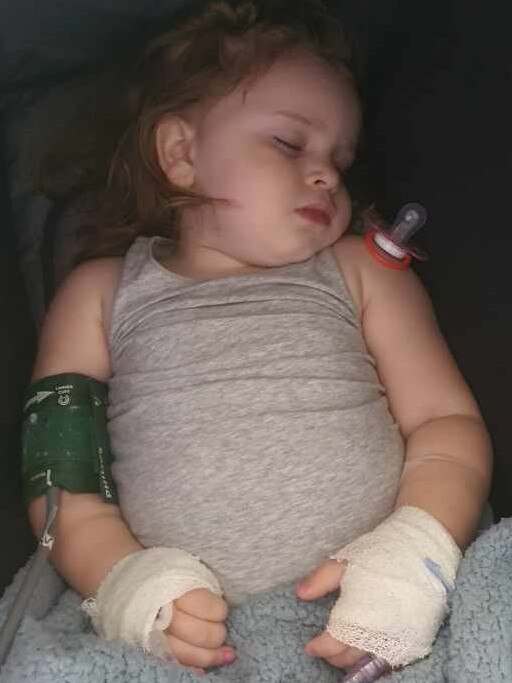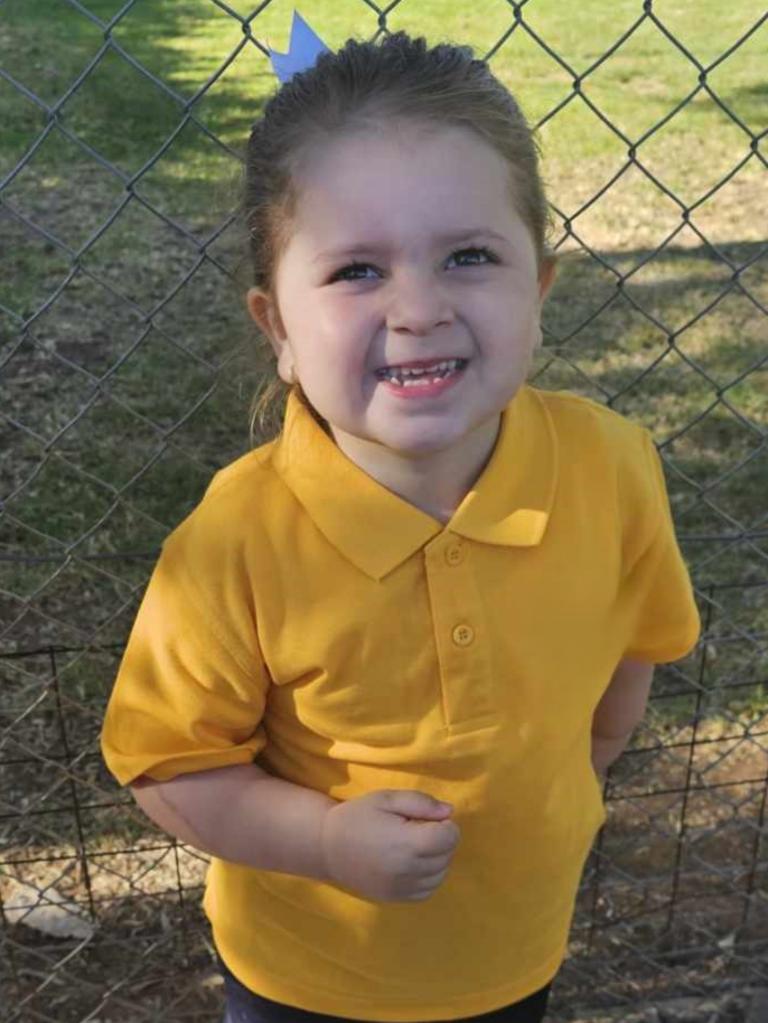Toddler’s right side of body becomes suddenly paralysed but she faced six-hour ED queue
Two-year-old Samara was an average toddler running around the home – but she’s been left with mobility deficits after languishing paralysed in the WCH emergency department for six hours.

SA News
Don't miss out on the headlines from SA News. Followed categories will be added to My News.
A toddler who suddenly became paralysed and lost her ability to walk overnight was forced to wait six hours in a hospital emergency room.
Samara, who was two at the time, had been running around her family home playing joyfully and the next day she was unable to hold herself up before she was rushed to the Women’s and Children’s Hospital emergency department by her mum Natasha N.
“One day your child is walking and the next day she isn’t,” she said.
“It’s hard … it’s scary.”


On September 16, 2022 when Natasha brought her second child into the WCH ED they waited six hours to be seen.
“When we brought her in, she had collapsed and lost her ability to hold herself up completely,” Natasha said.
By the time she was finally seen doctors assessed her and believed she might have had a stroke.
“I think they didn’t think it was as serious as what it actually was,” she said.
“They realised that she had paralysis on half of her body and she was pulling herself with her left side, but her right side was more or less completely immobile.”
An MRI revealed she had significant inflammation to her spinal cord and brain and was initially diagnosed with a rare auto-immune disease called acute disseminate encephalomyelitis (ADEM).


“Samara should have been seen as a priority on her arrival,” Nastasha said.
“If she was diagnosed and treated sooner, it may have stopped the rapid progression of her brain and spinal cord inflammation and prevented her being completely paralysed, needing intensive rehabilitation and 24/7 care at the time.
“For Samara it may have been the difference between her regaining close to 100 per cent of her mobility back as opposed to where she is now with the difficulties she continues to experience.”
Natasha said the level of care Samara experienced when she was seen was “excellent” and blamed the lack of resources and inadequate staffing for the delay.
“The system is tired, and so are the staff,” she said.

Further tests revealed Samara actually suffers from more specifically myelin oligodendrocyte glycoprotein antibody-associated disease (MOGAD) — an auto-immune disease where the immune system attacks and damages the central nervous system.
Samara was in hospital from September 16 to October 6 undergoing various treatments to keep the inflammation attack under control.
“She relied on us to do absolutely everything for her,” Natasha said.
Once the treatment started to work, Samara began rehabilitation to regain mobility but her life since has never been the same.
“Her mobility hasn’t come back 100 per cent at all,” Natasha said.
“She’s prone to falls and trips, she often has bruises down her legs, she has cuts up her arms.”
Samara, now aged 4, struggles with intense fatigue, incontinence, mood and sleep disturbances and constant pins and needles.
“It’s not an easy condition to live with,” Natasha said.


The now four-year-old requires a higher level of care than most kids her age. Since leaving hospital back in October 2022 she couldn’t attend child care for at least six months, then when she finally made the return she wasn’t able to access the level of care she needed according to her mum.
“We had to cease her care, impacting on our full time work and only then increased her care requirements,” she said.
Despite having access to NDIS due to her disability Samara does not qualify for carers allowance and the family’s access to childcare subsidy was stopped after Samara did not attend in 26 weeks due to her MOGAD requirements.
“This has caused a huge jump in out childcare fees for our youngest kids and impacted us substantially, financially,” Natasha said.
Women’s and Children’s Health Network Chief Executive Officer, Rebecca Graham apologised to the family for the distress caused.
“I apologise to Samara and her family for any distress caused while waiting within the Paediatric Emergency Department,” she said.
“Samara arrived at the Paediatric Emergency Department at 6pm on 16 September 2022, where she was appropriately triaged by nursing staff.
“Observations were taken and pain relief commenced at approximately 7.30pm. This afternoon I requested a review of this case and I am confident that our clinicians took appropriate steps to care for Samara, including ordering extensive scans and tests.
“We are continuing to support Samara and her family. We aim to see patients quickly within our emergency department and to support this we have trialled new projects.
“These include a new team of doctors and nurses that assess children within the waiting room, introducing mental health clinicians into our Child and Adolescent Virtual Urgent Care Service and a piloting project that provides quicker ultrasound tests to reduce overall waiting times.”
Opposition leader and acting health spokesman David Speirs said “a child is missing out on crucial care because the health system is on its knees and unable to cope with demand”.
“And all because of record ramping and chronic overcrowding on Peter Malinauskas’ watch,” he said.
“The impacts of Labor’s failure to deliver mean patients with serious issues — like brain and spinal cord inflammation — are waiting hours on end for potentially critical treatment.
“These are unacceptable and dangerous delays and we fear hospital wait times will blowout further when the current Code Yellow ends and the ban on elective surgeries is finally lifted.
“Despite Peter Malinauskas’ promises our health system is going backwards under Labor and South Australians are paying the price.”
Health Minister Chris Picton said he is “sorry to hear of Samara’s experience almost two years ago”.
“Since that time, we have added more doctors and nurses at the Women’s and Children’s Hospital including in the emergency department to help improve waiting times,” he said.
“It’s disgusting but not surprising David Speirs would seek to play politics with this case, that happened just six months after he and the Liberals were in government.
“We are building a bigger and better Women’s and Children’s Hospital, compared to David Speirs’ plan which would have seen just one extra overnight bed.”
More Coverage
Originally published as Toddler’s right side of body becomes suddenly paralysed but she faced six-hour ED queue






